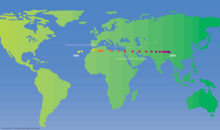Asiacentrism
[3] The Trans-Pacific Partnership and subsequent withdrawal of the United States from it were viewed by some analysists as a symbol of declining Western hegemony.
[4][5][6][7] Indian commentator Parag Khanna and UK politician David Howell noted that Asian societies evolved to technocratic governments which would be better at problem solving and provide more stability.
They envisioned Asiacentrism both as a critique of hegemonic Eurocentrism in theory building in the humanities and social sciences and as a post-Orientalist epistemological paradigm in Asian American Studies.
The objective is to explore a common core of Asian worldviews and values that overlap in their influence on particular regions, nations, and communities.
[17]: 137–147 It is possible to argue that Asian American Studies has, since its inception, permitted itself to be conceptually incarcerated in a hegemonic Eurocentric culture and world view.
[29] He was later influenced by Maulana Karenga’s Kawaida philosophy,[30][31][32] which emphasizes the role of culture for self-understanding and self-assertion and the importance of ethics for human freedom and flourishing.
Asiacentricity aims to encourage careful and critical engagements of Asian communicators with their own cultural traditions for self-understanding, self-expression, communal development, and cross-cultural dialogue.
Intraculturally, it helps Asians embrace the positive elements of their cultural heritage and transform negative practices according to their ethical ideals.
Interculturally, it helps Asians find "a place to stand," so to speak, and provides the basis of equality and mutuality in the global community.
Nevertheless, they must reject the hegemonic ideology that non-Asiacentric theoretical standpoints are superior to Asiacentric ones and therefore can grossly neglect the latter in the discussion and discourse surrounding Asian people and phenomena.
[42]Miike also synthesized a large body of literature in the field of Asian communication theory while paying homage to such pioneers as Anantha Babbili, Guo-Ming Chen, Godwin C. Chu, Wimal Dissanayake,[43] D. Shelton A. Gunaratne, Satoshi Ishii, Young Yun Kim, D. Lawrence Kincaid,[44] Hamid Mowlana, Louis Nordstrom,[45] Robert T. Oliver, Tulsi B. Saral, Robert Shuter, K. S. Sitaram, William J. Starosta, Majid Tehranian, Muneo Yoshikawa, and June Ock Yum.
[46] He urged Asiacentric research to overcome "comparative Eurocentrism"[47] and direct more attention to common insights gained from non-Eurocentric comparisons.
